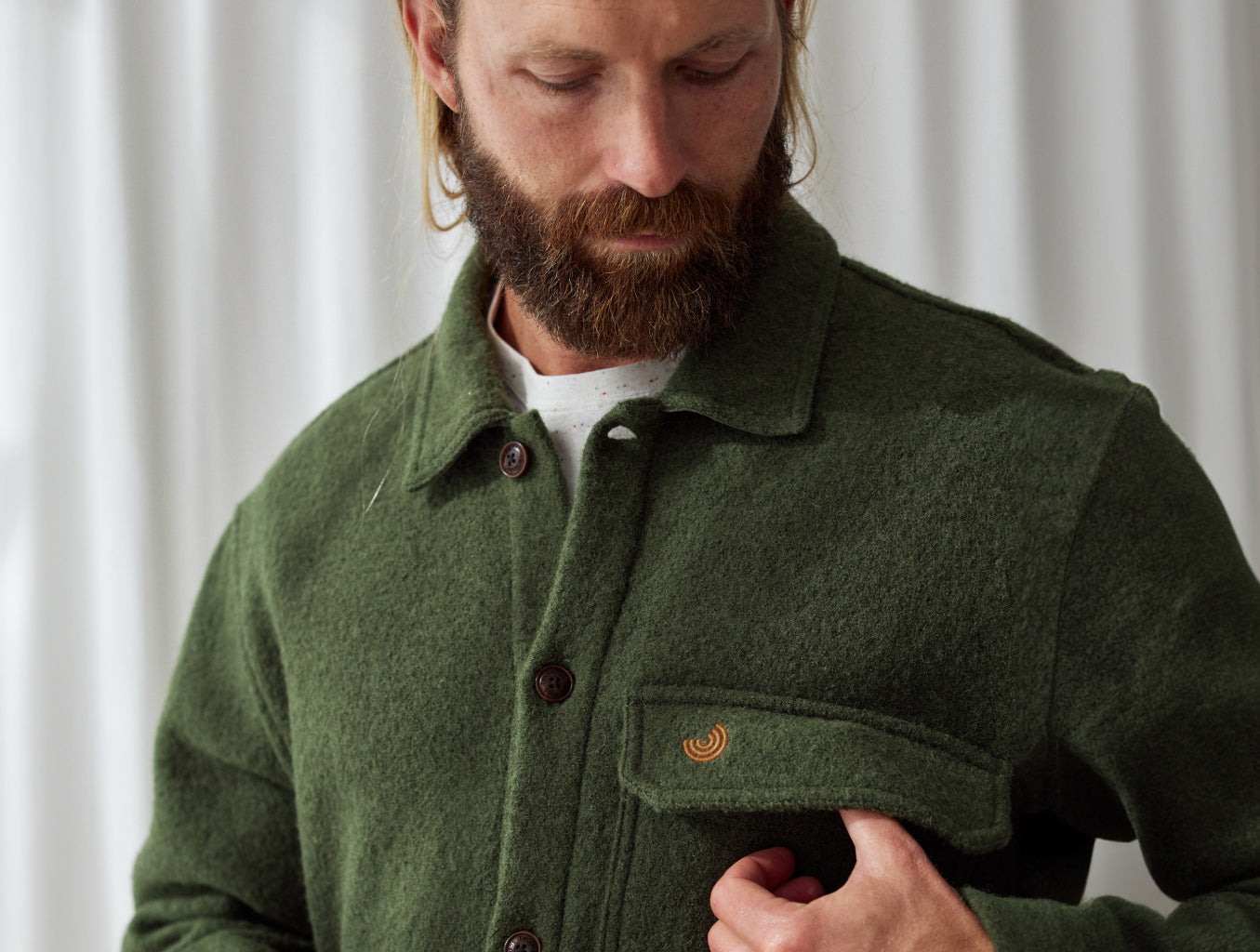Do you know which textile accounts for more than 50% of the world’s fibre production? It’s polyester. This petroleum-based polymer has long been associated with low garment prices, wrinkle-free clothing, and sportswear. Despite its world domination, polyester is not good for the planet.
As a sustainable shopper you probably knew that already. Virgin polyester (“virgin” meaning any newly cooked-up fibre) doesn’t have a great rep, and you may already be sensibly steering clear. But just how sustainable are the alternatives to virgin polyester? And can we justify polyester’s use on the basis of its material properties? This blog post pits virgin polyester against one popular alternative, recycled polyester.
Polyester
Meet fashion’s favourite polluter.
Pros
- Cheap to produce
Polyester came of age after the second world war, when advances in chemical manufacturing enabled cheap and fast production of artificial fibres. This is why polyester clothing is so affordable.
Make no mistake though: the price of polyester doesn’t reflect its cost for the planet.
- "Durable"
This one’s in quotation marks, because we’d question the durability of clothing that is intended to be thrown away, rather than used again and again. While polyester is made up of strong polymers that can resist strain, it often ends up in landfill, turning its best strength into its worst problem - polyester t-shirts can take anywhere from 20-200 years to decompose.
- Easy to care for
We have to admit, polyester requires little attention, and dries very quickly.
- Wrinkle-free
Along with its low costs, this was one of the reasons polyester became a staple of the 70s. Forget wrinkles: try the fabric that never gets old. Then again - maybe don’t.
Cons
- Fossil Fuels
You simply can’t make virgin polyester without ethane - which is extracted from fossil fuels like oil and gas. Fossil fuels are catalysts of climate change, pumping out a scary 36.6 billion tonnes of carbon dioxide every year. That’s why many environmental organisations are calling for an end to fossil fuels. The fashion industry’s dependence on virgin polyester isn’t going to help.
- Non-renewable
Fossil fuels are also non-renewable: once they’re gone, they’re really gone. Polyester therefore contributes to resource scarcity and cannot be considered sustainable. One of the tenets of sustainability is the protection of natural resources for future generations.
- Non-biodegradable
As mentioned before, polyester doesn’t biodegrade naturally. It can take hundreds of years to decompose. When petroleum based polymers do decompose, they release toxic chemicals into the environment, doing further harm to the planet.
- Pollutes the ocean
But before any of that happens, it will need to be washed at some point! Polyester is a plastic, and releases tiny microplastics when washed. These trickle down the water chain and flow into the ocean where they are gobbled up by small aquatic organisms.
- Pollutes the planet
Polyester has a large carbon footprint, which means that it is making our planet steadily more unlivable. Beyond this, factories that manufacture polyester can leak toxic chemicals into the surrounding environment.
- Overproduced
Polyester plays a hand in overproduction. Flick through any Black Friday campaign and you’ll see hundreds upon hundreds of virgin polyester styles. This year, one infamous fast fashion brand was found to use polyester in 85% of their products. That same brand launches 700-1000 new products every. single. day.
Recycled Polyester
Say hello to the recycling revolution.
Pros
- Recycling is resourceful
We love recycled fabrics for two simple reasons: they keep resources in the ground and make use of materials that already exist. Is it ideal that so much plastic exists? No. What can we do about it? Recycle it into fibre that can be used again and again.
- Same quality as virgin polyester
Recycled polyester shows very little loss of quality versus virgin polyester.
- (Almost) no fossil fuels
Recycled polyester doesn’t require the refining of oil and gas. That doesn’t mean, however, that fossil fuels aren’t burnt to deliver the energy required to recycle polyester. This depends on the electricity supply of each factory.
Recycled polyester styles represent a necessary step back from the fossil fuel industry.
- Fewer emissions
The energy needs of mechanically recycled polyester are smaller than those of virgin polyester. As it is not directly linked to fossil fuels, it also produces fewer greenhouse gas emissions that way too.
- Less water
Polyester is a water intensive polymer. Good on you claim that the cooling needed for polyester production can result in reduced water quality and availability. By contrast, Panaprium says that recycled polyester can reduce water consumption by 99% versus virgin polyester.
Cons
- Diverts single-use plastic
The most common source for recycled polyester is single-use plastic, primarily bottles. Recycling plastic bottles into a nice jersey or fleece may sound (and look) really cool, but it may not be optimal. Critics say that plastic bottles are already being recycled into more plastic bottles - a process that can be done at least 10 times. It would therefore be much better if recycled polyester was sourced from within the textile industry.
- Not fully circular
This is a buzzword we see coming up a lot in sustainability conversations. We shouldn’t assume that recycled polyester fibres are truly “circular” as that would mean they can be recycled again and again - theoretically avoiding landfill forever. In reality, fashion is rarely recycled. So until we can find another use for recycled polyester garments at the end of their life, they won’t be considered fully circular.
- Sheds microfibres
This is the real bad news: recycled polyester still sheds microfibres. Which means you should always use a microfibre catching bag when you wash it.
Best Uses Of Recycled Polyester
Only 3.6% of our fabric mix was recycled polyester in 2021. It falls behind organic cotton, wool, and TENCEL™ Lyocell and linen, showing our commitment to non-synthetic textiles. We tend to use recycled polyester in items like bucket hats, socks and outerwear. These products are crafted with love and attention to detail - they’re made to last. Check out our Laurie Mustard jacket as a great example - it’s made from a smooth recycled polyester shell with cosy recycled polyester fleece on the inside. A coming-together of two different types of recycled polyester in a gloriously sunny style.
Outerwear is arguably one of the best uses of recycled polyester as it is not washed as frequently as other garments reducing microfibre shedding.











